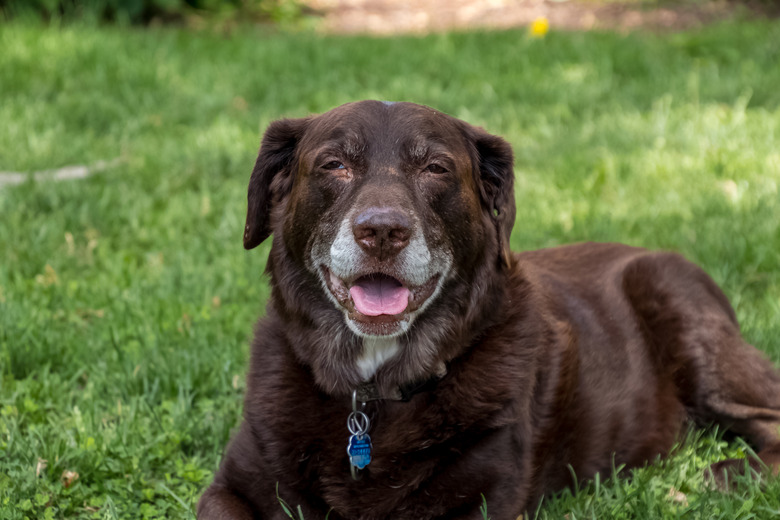Gray Hair Problems In Labrador Retrievers
Some dogs, such as Labrador retrievers, tend to gray early. Gray hair occurs when hair follicles make fewer melanin-producing cells. Melanin is the pigment that provides color to hair, skin, and fur. When less melanin is produced, hair starts graying. The cause of this and the timing are most likely determined by genetics. Much like some people begin getting gray hair in their 30s, some young dogs start going gray at an earlier age. Often, dog owners may notice these gray hairs around the dog's muzzle.
Why is my dog gray?
Why is my dog gray?
Graying is normal in Labrador retrievers. Labrador retrievers usually live between 10 and 12 years. As your Lab enters old age, you will notice that their fur begins to gray, particularly around the eyes, mouth, and nose. This is characteristic of this breed of dog. Graying can start before the Labrador retriever turns 7 years old, and it will become more prominent over subsequent years.
You may also notice that the fur on your Labrador retriever's feet has become gray, especially in the area around the pads and in between the toes where there is long hair. It is also easier to notice a color change, early graying, or white hair on a dog with dark hair, such as a black or chocolate Labrador retriever, than on a white dog.
When to be concerned about your Labrador retriever
When to be concerned about your Labrador retriever
While graying is to be expected, if your dog is young and has gray hair, this may indicate a medical problem that has altered the color of the dog's hair. There are several diseases that can cause changes in the color or appearance of a dog's fur and suggest that the dog needs to be seen by a veterinarian. When premature graying occurs, it is often accompanied by a change in the texture of your dog's hair (it becomes softer) and by hair loss. Take your dog to the veterinarian so they can determine what is going on.
Hypothyroidism in dogs
Hypothyroidism in dogs
Hypothyroidism could be the cause of premature graying or gray hair. Hypothyroidism is a condition where a dog has underperforming thyroid glands. It can also present as symptoms such as weight gain and other skin issues. Once your dog gets appropriate treatment for hypothyroidism, the gray hair may subside and even reverse since the root cause is being addressed. If your dog has one or several of these symptoms, bring this up to your veterinarian in case it is caused by a medical problem.
Cushing's disease in dogs
Cushing's disease in dogs
Cushing's disease, which is also referred to as Cushing's syndrome, is a condition where the dog's adrenal glands overproduce specific hormones. The adrenal glands are responsible for producing many vital substances that regulate essential body function to keep a dog healthy and alive. One specific substance is cortisol, and too much or too little cortisol can be life-threatening.
Symptoms of Cushing's disease include more frequent urination, increased water and food intake, and increased appetite. Lethargy, panting, and a pot-bellied appearance are also potential signs. A poor hair coat as well as chronic skin infections, thin skin, hyperpigmentation, poor skin healing, skin mineralization, and persistent bladder infections are other symptoms to look out for. So, if you notice sudden changes in your dog's coat, this deserves a visit to the veterinarian to rule out this serious medical condition.
Vitiligo in dogs
Vitiligo in dogs
A rare skin condition called vitiligo could be the cause for a change in coat color in the form of white hair in dogs. Vitiligo is thought to be hereditary and affects the melanin-producing cells in a dog's body. It is more prevalent in purebred dogs than mixed breeds due to the hereditary component of the condition.
Vitiligo may present as pigment loss in patches of skin and fur or even their entire body, or it may start in one area and spread over time. It can also cause dandruff and skin lesions, but fear not — all of these symptoms are painless and cosmetic, so your dog is not suffering.
Other concerning causes of a dog's gray fur
Other concerning causes of a dog's gray fur
Allergies can also be the culprit for pigment changes in the fur. There are some diseases, such as liver and kidney disease, that could potentially be a health issue affecting the quality of a dog's coat. This may result in gray hair. However, this is often a more rare symptom of liver and kidney disease.
These diseases lead to toxins not being removed from the body rapidly enough. Once the disease is addressed and treated, the gray hair may be reversible. Your veterinarian may refer you to a specialist in these diseases.
Why do dogs go gray from stress?
Why do dogs go gray from stress?
Stress can contribute to or be a cause of gray hair in dogs. Much like how stress can affect the health of humans, the same can be true for dogs. It is thought that stress may cause the body to stop producing pigment in the same manner as before.
Anxiety, impulsive behavior, and fear responses are associated with increased gray hair in dogs. It can be helpful to consult with a veterinary behaviorist who can work with a fearful or reactive dog. This support can help improve the dog's quality of life and reduce their anxiety.
The bottom line
The bottom line
Graying of the muzzle and gray hair on a Labrador retriever is normal, and oftentimes, it's not a cause for concern, especially among black dogs or those with dark brown fur. If you notice sudden changes, new patches of white hair or gray hair, or gray hair occurring prematurely when your dog is under 7 years of age, bring it up to your veterinarian to rule out any potential medical concerns, such as hypothyroidism, Cushing's disease, vitiligo, allergies, and other diseases.


